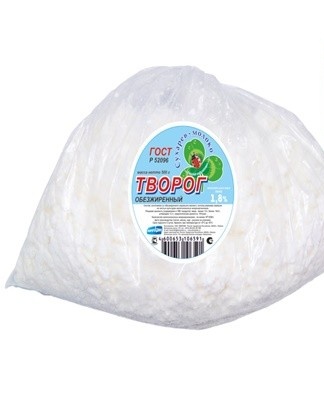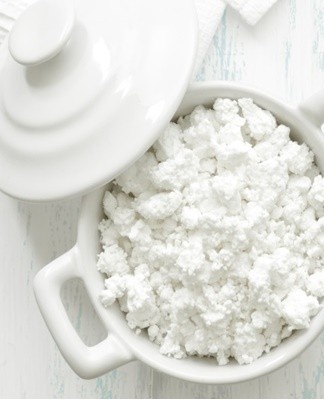How much cottage cheese can be stored in the refrigerator, conditions and rules
All varieties of natural cottage cheese are healthy dairy products. They are included in the children's menu, therapeutic diets, they are useful for pregnant and lactating women. Therefore, it is important to know under what conditions and how much cottage cheese can be stored in the refrigerator so that it does not deteriorate. Freezing will preserve all the benefits of a perishable product.
Description and characteristics of the product
It is one of the oldest foods people learned to make from milk. In the past, in Russia it was called "cheese". Therefore, syrniki loved by many are made from this fermented milk product. Curd products from curds are obtained after fermentation of curds and separation of whey. It can be fatty (up to 18%), fatty (9%) and non-fatty (up to 3%).
The unique technology makes it possible to extract useful and important components from milk - easily digestible milk proteins and fats.The composition contains lactose, vitamins and minerals, enzymes, proteins.
Beneficial Features:
- Of all dairy products, cottage cheese is the champion in protein content. It is enough to consume 9 tablespoons a day. I. product.
- Cottage cheese is a staple on the menu for kids of all ages. It is easy to digest and recommended for dietary nutrition.
- They are rich in calcium, which is a "building material" for the skeletal system of the human body. The product should be included in the menu for pregnant and lactating women.
- Regular consumption of cottage cheese will help normalize the level of hemoglobin in the blood. This is facilitated by iron - a useful trace element.
- The amino acids contained in the product help prevent the development of diseases of the kidneys, liver, heart, blood vessels, gastrointestinal tract and lungs.
- Cottage cheese in natural or cooked form helps strengthen the immune system, is useful for diseases of the thyroid gland and has a beneficial effect on the functioning of the nervous system.
The production of curd is carried out with heat treatment. Under these conditions, the lactose is broken down. This is especially important for people who are intolerant to lactose, a protein found in milk.
Cottage cheese should not be used for allergies or individual intolerance to the product, high cholesterol, kidney disease.
At home, it is made from kefir, which is heated, then the resulting clot is transferred to cheesecloth and sent under oppression so that all the serum flows out. Many delicious dishes are prepared from it (dumplings, dumplings, cheesecakes, Easter), added to fillings for pies.
How much and under what conditions to store
Any type of cottage cheese is a perishable fermented milk product, the shelf life depends on various factors.

What affects shelf life:
- Heat treatment method. In the production of a factory product, special processing technologies are used, which allows the curd to stay fresh longer.
- Storage temperature.
- Pack.
- Fat content. Products with a fat content of 18% or more deteriorate the fastest.
Proper storage will save you from health problems.
In the fridge
To increase the shelf life of cottage cheese, it is better to store it in places with low temperature indicators. Almost all fermented dairy products contain lactic acid bacteria, which constantly multiply in comfortable, warm conditions. It quickly spoils the cottage cheese.
And to keep it fresh, it is better to use the refrigerator. The temperature should not be higher than 8 Cᵒ.
Expiry dates:
- in bulk without packaging - 24 hours;
- home - 2 days;
- ordinary cottage cheese, curd mass - 72 hours;
- pasteurized - 5 days;
- long-term storage - 15 days, provided that the integrity of the packaging is preserved.
In the freezer
Cottage cheese is usually not stored for future use. But it happens that there are a lot of them, and a freezer will help solve the problem of storing the product. Its power determines how long it can stay there in order to retain its useful and taste qualities.

Storage periods:
- - 2 Cᵒ - week;
- up to -18 Cᵒ - 2 weeks;
- - 25 Cᵒ - 20 days;
- - 35 Cᵒ - up to 1 month.
Frozen foods can stay in such conditions for a long time.
Freezing and thawing
For a fermented milk product to retain its qualities, it must be frozen in accordance with the following rules:
- The curd must be fresh before freezing.
- It should be divided into small portions, chopped into large pieces.
- Use hermetically sealed packaging.
- When self-packing, be sure to note the freezing date.
Full-fat fermented dairy products keep best in the freezer. In such conditions, it does not lose its qualities. And the dietary takes on a crumbly consistency, becomes dry. Thawing the curd should be done gradually. A sudden temperature change can ruin it. Transfer the packaging from the freezer to the refrigerator. There, in 3-4 hours, it will slowly melt, be ready to eat or cook.
How to Pack Properly
A well-chosen packaging will ensure good preservation of the curd. Left open for a long time, it dries quickly and absorbs aromas. Different packages are used to store this fermented milk product.

Empty
Vacuum packing will allow you to extend the freshness of cottage cheese for up to 4 weeks. In sealed conditions in the absence of oxygen, the life processes of lactic acid bacteria slow down.
Sheet and parchment paper
Such packaging is suitable for storing low-fat cottage cheese, in which there is no excess moisture. Small portions are wrapped in parchment paper or aluminum foil; you can store them in the fridge for up to 36 hours.
cotton fabric
Very often, a piece of clean cotton cloth is used to store cottage cheese. Condensation does not form on it, the product does not dry out. But due to the breathability of this material, the wrap should be kept away from strong-smelling foods.
Enamel and glassware
This product can be stored in glass bowls or enamel pans. But the dishes should be tightly closed with lids.
clay container
In the past, there were no refrigerators and perishable foodstuffs were stored in deep cellars, where they were cool all year round, using terracotta. But this method can be used even now, when it is not possible to use the refrigerator.
A thick layer of salt is poured into a deep earthen bowl. Cottage cheese is laid on top and tightly packed. The whole is covered with a piece of cotton cloth soaked in a concentrated solution of salt. The edges of the bowl are tied and tucked away.
How much can be stored at room temperature
In a warm room, the fermentation process will accelerate in the product, and its shelf life will be sharply reduced. Especially when it's in a package. Condensation quickly forms. This is a favorable environment for changes in the microflora and deterioration of the product. The musty smell also speaks for itself.

If the cottage cheese is opened at room temperature, for example, on a plate, then it cannot stay in this form for more than 4 hours.
How to choose the right one
Natural curd is prepared from a minimum of ingredients. It is milk and sourdough of lactic acid bacteria. But among many manufacturers of fermented milk products, there are many unscrupulous ones who add components to it that increase the shelf life (starch, palm oil). This affects its quality.
In order not to be mistaken in choosing a product when buying, you should pay attention:
- white or cream color;
- there is no bitterness in the taste;
- pleasant smell of sour milk;
- sealed packaging;
- the noun "curd", not "curd product";
- the composition indicates the number of lactic acid bacteria;
- the shelf life does not exceed 36 hours.
Care should be taken with loose cottage cheese. It should be grainy and crumbly. When buying, give preference to trusted manufacturers.
The high-quality curd mass has a uniform consistency. The presence of grains indicates the presence of artificial thickeners in the composition.
Signs of product deterioration
Spoiled cottage cheese can be recognized by an unpleasant sour smell and bitterness in taste. A viscous coating, traces of mold appear on its surface. Such a product should not be consumed at all and immediately removed from the refrigerator.
Tips & Tricks
There are a few nuances for storing cottage cheese at home:
- stretch film, polyethylene, plastic accelerate oxidation processes, which shortens the shelf life of fermented milk products;
- ideal storage utensils - enamel and glass with tight lids;
- to slow down the oxidation process, you can put a piece of sugar in a container with cottage cheese;
- if the product has been stored in the refrigerator for more than 72 hours, it is better to use it for cooking casseroles and other dishes.
Baby curds in plastic containers cannot be stored after opening the package. They should be eaten immediately or used for cooking.
When choosing cottage cheese for your diet, you should always be careful. Pay attention to the integrity and tightness of the product packaging, its name and expiry date. Compliance with these rules will help strengthen your body and not harm your health.



